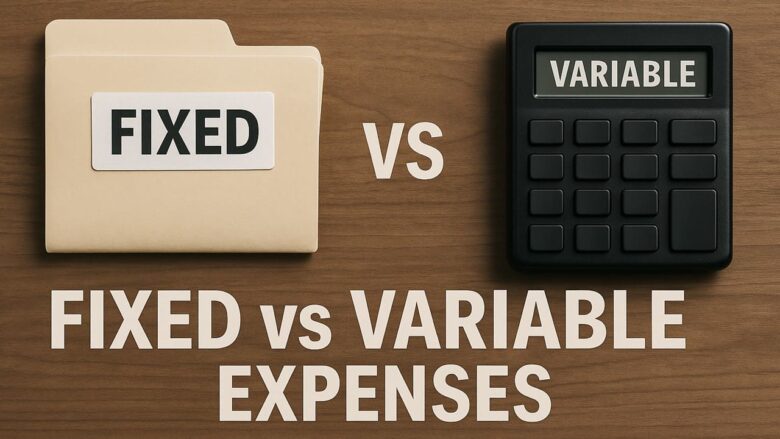To manage your financial situation, it is essential to know the different types of expenses you have to pay every month. These are the expenses you pay for your day-to-day life. They can differ greatly depending on your lifestyle, requirements, and responsibilities. We typically categorize these expenses into two types: fixed expenses and variable expenses. Knowing the difference between these two is the first step toward making a sound and realistic budget. When you are aware of the different types of expenses, you will be able to be more organized, make better financial decisions, and avoid slipping into unneeded debt.
What Are Fixed Expenses
Fixed expenses are the costs that remain constant each month. They generally have obligations that remain the same regardless of any changes in your life or your spending habits. For instance, your mortgage or rent payments are usually the same every month. This is also true for installments on loans, car payments, and subscription services. These costs are usually predictable and contractual, which means you must pay them regularly. Because they can’t be changed easily, fixed expenses are the basis of your budget for the month. Knowing the fixed costs helps to determine the basic amount of money you’ll require to meet your obligations for the month.
The Nature of Variable Expenses
Variable costs are a variation of fixed costs. The costs vary every month based on your habits or usage. As an example, the amount you spend on food items, eating out, leisure, clothes, and fuel may be significantly different based on your preferences and lifestyle changes. The cost of utilities like electricity or water could also be considered variable costs, in particular if your usage is dependent on the season. Contrary to fixed costs, which are a fixed cost, variable costs give you greater freedom and control. They’re usually the first thing you are able to alter when you’re trying to cut back on expenditure. Monitoring these expenses closely will allow you to identify squander behaviors and make better choices.
Why Knowing the Difference Matters
Knowing the difference between variable and fixed expenses is vital to managing your money efficiently. When you understand which costs have a fixed price and which ones are variable, it is easier to predict your monthly financial requirements. Fixed costs require constant planning to ensure that your obligations are being met, whereas variable costs can be adjusted depending on your financial circumstances. This can help you plan for emergencies, create realistic financial goals, and prevent budget deficits. If you’re saving for a big purchase or trying to reduce debt, getting rid of your variable and fixed costs is an effective strategy to ensure your finances stay on the right track.
How to List and Categorize Your Expenses
Making a list of your monthly expenses and then placing each in either a variable or fixed category can be a useful budgeting method. Begin by recording the total monthly expenses you know about that range from the cost of loans and rent to transportation and groceries. You can then determine which are fixed—those that don’t change—and which are variable, which means they can change. This method gives you a better understanding of your spending routines. You’ll be able to identify the areas that are steady and predictable and those that require more care. A categorical list can be helpful whenever you review your budget for updates or enhancements.
Managing Fixed Expenses Effectively
Although fixed costs are constant, they should not be overlooked when you are trying to improve your financial well-being. In some instances, you may be able to cut the cost of these expenses by renegotiating or refinancing. In particular, you might be able to get cheaper insurance, cut down on the cost of cable, and refinance or extend your loan to get an improved rate. Regularly review fixed costs to ensure you’re getting the best value for your money. Furthermore, since fixed expenses aren’t negotiable in the near term, they must be first considered when allocating your earnings. In the event of a missed fixed payment, it can affect your credit score and result in the cancellation of services.
Controlling Variable Expenses for Better Savings
Variable expenses allow for flexibility and are typically the first thing to consider when trying to cut costs. You can save a lot of money on these expenses by being more aware of your habits and lifestyle. Like making meals at home rather than dining out or taking public transport instead of driving each day could result in a dramatic impact on your monthly budget. Setting spending limits for different categories and ensuring they are adhered to can help you remain in control. Regularly monitoring these expenses with journals or apps helps to keep you on top of the situation and implement necessary changes before spending becomes an issue.
Preparing for Unexpected Changes in Expenses
It’s not easy to predict the future, and your costs can change without notice. While fixed expenses are typically steady, they may increase due to rent increases or insurance premium adjustments, or changes in interest rates for loans. Additionally, variable expenses can increase during certain periods in the course of a year, like holidays or during vacations. Therefore, it’s crucial to prepare for unforeseen expenses by setting aside funds for an emergency savings account. Retrospectively reviewing your budget helps you adapt to the changes and reduce financial strain. Being proactive instead of reactive means you are ready to handle unexpected changes without cost.
The Role of Discipline and Consistency
Being able to manage both fixed and variable costs requires discipline and coherence. Maintaining your budget requires regular monitoring, review, and making adjustments to your spending routine. Fixed costs must be paid on time to avoid penalty charges, and variable expenses need to be tracked to prevent waste. Little choices made every day can have an impact over the course of time. If you are committed to a disciplined approach to finances, it is possible to build savings, cut down on debt, and set longer-term financial goals. If you are more disciplined and consistent with managing your expenses, the easier it will be teasier o control your finances and ensure stability for the long term.
Conclusion
Knowing the distinction between variable and fixed expenses is essential to creating an effective financial plan. Fixed expenses are predictable and require consistent payment, but variable expenses offer you the ability to adjust and flexibility in adjustments. By identifying, categorizing, and tracking these expenses, you can build a balanced budget that meets your financial goals and also adapts to your personal needs. Making the right choices with regard to expenses will result in better decision-making, increased savings, and less stress. With focus and determination, you can apply this information to control your finances, make informed decisions, and get closer to financial freedom and security.
FAQs
1. What’s the most significant distinction between variable and fixed costs?
Fixed expenses remain the same every month, whereas variable costs change based on usage or behavior.
2. Can fixed expenses ever change?
Yes, fixed expenses may change; for example, the increase in rent or the change in insurance premiums. However, they tend to remain constant in the short run.
3. What is the reason it’s necessary to track variable costs?
The tracking of variable expenses will help you understand patterns in spending to reduce your waste and help you stay within budget.
4. Can I lower my fixed costs?
Reduce fixed costs by making deals for lower rates, removing unnecessary subscriptions, or refinancing loans.
5. Do I need to prioritize the payment of fixed or variable costs first?
Fixed costs should be considered first because they are often important and usually come with penalties if they are not paid.




